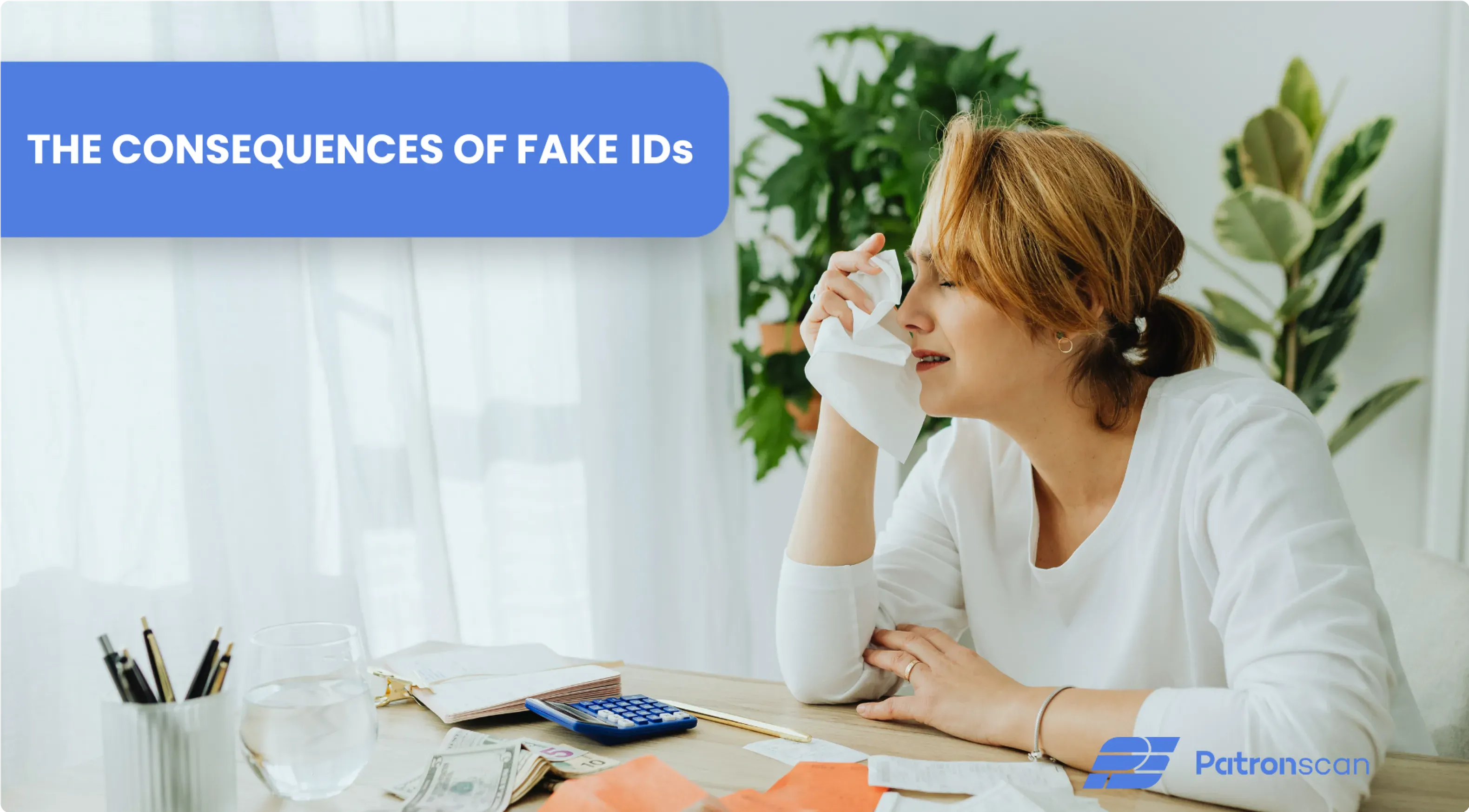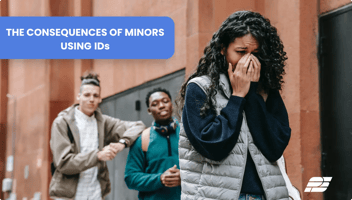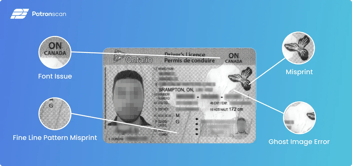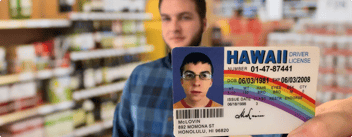The Rise and Consequences of Fake IDs

In popular culture, fake IDs are often portrayed as a harmless tool used to gain entry into exclusive clubs or purchase alcohol before reaching the legal drinking age. It's a common perception that their only purpose is to provide young adults with a fleeting taste for nightlife.
However, what many fail to realize is that the consequences of fake IDs extend far beyond innocent teenage mischief. In this blog, we aim to shed light on the alarming reality surrounding fake IDs and emphasize the need to change the collective conscience of the public.
- The rise of fake IDs
- Criminal implications
- Underage drinking
- Economic consequences
- Fraud & Identity Theft
Before delving deeper into the implications of fake IDs, it's vital to emphasize that possessing or utilizing a fake ID is against the law in many jurisdictions. Engaging in such activities can lead to severe repercussions.
The Rise of Fake IDs
The ease of obtaining fake IDs has risen dramatically with advancements in technology. Online platforms and websites offering easy access to high-quality fake IDs have proliferated, catering to a wide range of age groups. For example, there are websites where individuals can upload their photos and personal information, and within days, receive a convincing counterfeit identification document in the mail.
According to DSA, around 59% of people between the ages of 15-20 possess a fake ID, which represents over 14 million false identities. DSA, 2020.
Based on a comprehensive analysis of over 200 million IDs scanned at Patronscan, our findings indicate that approximately 2-3% of all IDs are deemed to be counterfeit or fraudulent. This estimation is derived from a careful examination of various identification documents, such as driver's licenses, passports, and identification cards, in order to identify any potential inconsistencies or signs of forgery.
Criminal Implications
The use of fake IDs is not a victimless crime. Possessing or using a counterfeit identification document is illegal and can result in serious legal consequences. Law enforcement agencies are actively combating the use of fake IDs due to their connection to various criminal activities.
Using a fake ID can lead to various crimes and penalties. Misdemeanor charges are common, but felonies can apply in certain situations, such as buying a firearm with a fake ID or possessing forged government identification.
- Legal Consequences: False ID convictions carry the potential for incarceration. Misdemeanor offenses may result in confinement for up to a year, while felonies can carry sentences of a year or more, potentially extending up to a maximum of 10 years.
- Monetary Penalties: Fines serve as a prevalent form of punishment, with varying magnitudes. Individuals convicted of misdemeanors may be subject to fines of up to $1,000 or less, whereas those convicted of felonies may face significantly higher fines, potentially reaching up to $100,000.
- Probation: In cases of fake ID convictions, probation is frequently granted as an alternative to incarceration. Probation entails adhering to specific conditions, including regular check-ins with a probation officer, refraining from criminal affiliations, and fulfilling financial obligations. Non-compliance with these terms can lead to probation extension or, in severe cases, potential imprisonment.
Underage Drinking
Fake IDs enable minors to access alcohol, leading to serious public safety concerns. Research has shown that underage individuals with fake IDs are more likely to engage in heavy drinking, increasing the risk of alcohol-related accidents, alcohol poisoning, and unsafe sexual behaviors. (College Studentsâ, Use of Fake IDs May Contribute to Risk for Alcohol Use Disorder, June 12, 2023)
In a survey conducted by the Substance Abuse and Mental Health Services Administration, it was found that nearly 30% of underage individuals who used fake IDs obtained them online, highlighting the ease of access and potential dangers associated with underage drinking facilitated by fake IDs. This easy access to obtaining fake IDs increases the likelihood of underage drinking, which can lead to various negative consequences.
According to Centres of Disease Control and Prevention (CDC) 15% of high school students reported having ever used select illicit drugs and alcohol. (High-Risk Substance Use in Youth, September 29, 2022)
Economic Consequences
The use of fake IDs has significant economic implications, particularly for businesses that serve alcohol. When an establishment or venue is caught serving alcohol to underage patrons, businesses face severe penalties, including fines and license suspensions.
For instance, a single violation of serving alcohol to a minor can result in fines ranging from several hundred to thousands of dollars, depending on the jurisdiction. To combat the use of fake IDs, businesses must invest in advanced ID verification systems such as scanners. Utilizing a vetted solution provides businesses an opportunity to significantly reduce risks associated with inadvertently allowing minors into an establishment.
Fake IDs have significant financial consequences for the sale and distribution of liquor. In the United States, alcohol-related disorders cost over $175 billion annually. Government expenses amount to approximately $57 billion, while lost productivity reaches $14.6 billion. Health costs are estimated at $5.4 billion, and the reported pain and suffering amount to $36.9 billion. Source: “Effect of fake IDs on the economy, April, 2018”
Fraud & Identity Theft
Fake IDs not only facilitate underage drinking but also open the door to identity theft and fraud. Individuals whose personal information has been stolen for the purpose of creating fake IDs often suffer long-term consequences. Victims may face difficulties in obtaining loans, applying for jobs, or may even face legal repercussions for fraudulent activities committed in their name.
The utilization of Fake IDs extends its ramifications across a wide array of sectors, encompassing diverse industries and realms of society. Here are some notable examples:
- Financial Fraud: Fake IDs may be used to open bank accounts or credit cards under false identities, enabling individuals to engage in identity theft, money laundering, or fraudulent transactions.
- Employment Fraud: In certain industries, individuals may use fake IDs to gain employment by providing false credentials or qualifications, allowing them to secure positions they are not qualified for or have obtained through deceit.
- Immigration Fraud: Fake IDs can be employed in cases of immigration fraud, where individuals use false identification to misrepresent their immigration status, gain unauthorized employment, or deceive authorities.
- Social Engineering Scams: Scammers may use fake IDs as part of social engineering tactics, such as impersonating someone in a position of authority or trust to deceive individuals into providing sensitive information or access to secure systems.
- Ticket Fraud: In the entertainment industry, counterfeit IDs may be used to purchase tickets for events or shows using stolen credit card information. This allows fraudsters to resell the tickets for profit or gain unauthorized access to venues.
- Healthcare Fraud: Fake IDs can be utilized in healthcare fraud schemes, such as fraudulently obtaining medical services, prescription drugs, or insurance coverage by misrepresenting one's identity or eligibility.
- Academic Fraud: Students may resort to using fake IDs to gain access to restricted areas, cheat on exams, or misrepresent their qualifications or credentials during the admission process or job applications.
The Importance of Combating Fake IDs
Fake IDs are far from a harmless tool for gaining entry into adult-only venues. They represent a widespread problem with multifaceted consequences that extend beyond the realm of nightlife. Recognizing the true impact of fake IDs will empower individuals to take a stand against their production, distribution, and use.
By doing so, we can safeguard our communities, protect vulnerable individuals, and foster a society that values integrity and responsibility. It's time to unmask the hidden epidemic of fake IDs and collaborate in bringing about transformative change.



